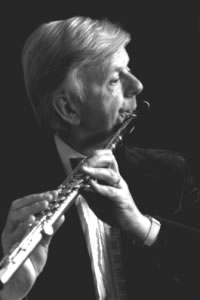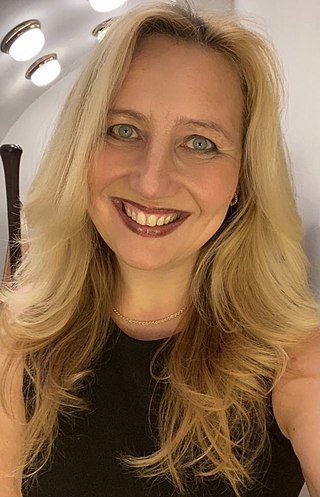A concerto is, from the late Baroque era, mostly understood as an instrumental composition, written for one or more soloists accompanied by an orchestra or other ensemble. The typical three-movement structure, a slow movement preceded and followed by fast movements, became a standard from the early 18th century.
Richard Gilford Adeney was a British flautist who played principal flute with the London Philharmonic Orchestra and the English Chamber Orchestra, was a soloist and a founding member of the Melos Ensemble.
Sinfonia concertante is an orchestral work, normally in several movements, in which one or more solo instruments contrast with the full orchestra. It emerged as a musical form during the Classical period of Western music from the Baroque concerto grosso. Sinfonia concertante encompasses the symphony and the concerto genres, a concerto in that soloists are on prominent display, and a symphony in that the soloists are nonetheless discernibly a part of the total ensemble and not preeminent. Sinfonia concertante is the ancestor of the double and triple concerti of the Romantic period corresponding approximately to the 19th century.
Susan Milan is an English professor of flute of the Royal College of Music, classical performer, recording artiste, composer, author and entrepreneur.
Gordon Hunt is a British musician and conductor. Regarded as one of the world's leading oboists, Hunt has served as principal oboe of the Philharmonia and London Chamber orchestras, a professor at the Guildhall School of Music and Drama, and an Honorary Associate of the Royal Academy of Music.
Emma Johnson is a British clarinettist, who was appointed MBE for services to music in 1996.
Simon Andrew Thomas Standage is an English violinist and conductor best known for playing and conducting music of the baroque and classical eras on original instruments.
Lisa Beznosiuk is an English flautist of Ukrainian and Irish descent, specializing in period performance of baroque and classical music on historical flutes.

The Concerto for Flute, Harp, and Orchestra in C major, K. 299/297c, is a concerto by Wolfgang Amadeus Mozart for flute, harp, and orchestra. It is one of only two true double concertos that he wrote, as well as the only piece of music by Mozart for the harp. The piece is one of the most popular such concertos in the repertoire, as well as often being found on recordings dedicated to either one of its featured instruments.
Richard Watkins is a horn player. He performs as a concerto soloist and chamber music player. He was Principal Horn of the Philharmonia Orchestra from 1985 to 1996, a position he relinquished to devote more time to his solo career.

Maria Krushevskaya is a virtuoso Russian harpist. She was the gold medalist of the 2007 USA International Harp Competition, where she was awarded the Jan Jennings Prize for best performance of Pierné's Concertstück for Harp and Orchestra, the Mary L. Ogg Prize for best performance of Küne's Fantaisie sur un theme de l’opera Eugene Onegin, and best performance of Alvars' Introduction and Variations on Themes from Bellini's Opera Norma. Maria Krushevskaya was born in Moscow in 1984 in a family of musicians. She began to study music at the age of five. In 1992 she entered the Moscow Gnessin School of Music, graduating with distinction in 2002 and subsequently continued her studies at the Gnesins’ Russian Academy of Music from which she also graduated with distinction in 2008.
Katherine Bryan is a British flautist. She was appointed Principal Flute of the Royal Scottish National Orchestra in Spring 2003, at the age of 21.

Christopher Hyde-Smith was a British flautist.

The Sinfonia Concertante for Four Winds in E-flat major, K. 297b, is a work thought to be by Wolfgang Amadeus Mozart for oboe, clarinet, horn, bassoon, and orchestra. He originally wrote a work for flute, oboe, horn, bassoon, and orchestra, K. Anh. 9 (297B), in Paris in April 1778. This original work is lost.
Reinhold Glière wrote his Concerto for Harp and Orchestra in E-flat major, Op. 74, in 1938.
Varvara Ivanova is a Russian virtuoso harpist and winner of major prizes in many international harp competitions.
Philip Dukes is a British classical viola soloist.
Ursula Holliger, née Hänggi, was a Swiss harpist, known for her commitment to contemporary music.
Sarah Louvion is a French classical flautist. The award-winning player has been the principal flute of the Frankfurter Opern- und Museumsorchester from 2002, and is active as a soloist and chamber musician. She has given international master classes.

Jana Boušková is a Czech harpist and pedagogue. She has been the principal harpist of the Czech Philharmonic since 2005. Boušková is also a professor at the Royal College of Music in London since 2019, the Academy of Performing Arts in Prague since 2007, and she was the harp teacher at the Royal Conservatory of Brussels from 2005 to 2020.





